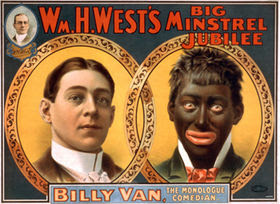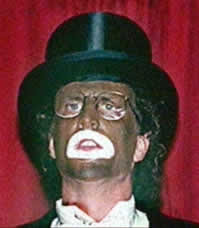James Alan Bland
- born in New York in 1854
- became a page in the U.S. House of Representatives in his teenage years
- graduated from college at age 19 with a Liberal Arts degree
- composed many popular minstrel show tunes, such as "Carry Me Back to Old Virginny", "Oh Dem Golden Slippers," and "De Golden Wedding"
oh and did I mention… he was an African-American?
This nation’s most popular form of entertainment in the nineteenth century, and our first truly unique contribution to the world’s musical culture, was minstrel music. Minstrelsy originated when some white racists decided to paint their faces black with burnt cork, greasepaint, or shoe polish and mimic the music and speech of African-Americans.

I’d like to think our society has evolved greatly from this time period – and here’s some proof that we have: October 8, 1993, Ted Danson (best known for his role on the sitcom Cheers) delivered a monologue in blackface at a Friar’s Club roast.
Even though he was romantically involved with Whoopi Goldberg at the time (and she actually wrote his offending monologue) the incident was universally panned by the public as being completely racially insensitive.
But let’s get back on track to James Bland and specifically his song "De Golden Wedding." What the hell is a "golden wedding" anyways? After unsuccessfully Googling the term I came up with a theory by analyzing the lyrics. The last line of the chorus goes "all the high-toned darkies will be at de golden wedding." Since this is a minstrel tune written by an African-American in Abolitionist times, I don’t think it’s much of a stretch to guess that "golden" in this context refers to skin tone. Golden seems lie somewhere between the continuum of black and white. The first verse also contains the phrase "yellow gals" which I’m assuming means the same thing. I don’t know if the song just relays the popular consensus at the time or James Bland’s personal opinion, but the lyrics seem to revolve around the idea that lighter skinned African-Americans are more sophisticated, refined, and therefore superior to darker skinned African-Americans. This idea of someone’s "degree of darkness" is still an issue today, although these days sometimes the argument can be that someone is not "black enough." There has been talk in the African-American community expressing concern that Barack Obama (born in Hawaii to a Kenyan father and a white mother) is not "black enough" to effectively represent the African-American community. I think Obama’s answer to this issue is profound. When interviewed by Steve Krofy on 60 Minutes Obama responded by saying that "when he walked down the streets of Chicago, visited a barber shop or tried to hail a cab, everyone knew he was black."
The question I struggled with the most is: what would drive James Bland, an African-American, to get involved with the racially offensive genre of minstrel music in the first place?
I came up with three possible answers.
1. MONEY
Minstrel music was big business. Bland joined his first minstrel group in 1875. Throughout the next several years he toured the United States. By 1881 he was a member of the Callender-Haverly Minstrels who traveled to England and performed for Queen Victoria and the Prince of Wales. At this point in time (in his mid-twenties) he was making around $10,000 a year – an incredible amount of money in the late 1800s. Unfortunately money has been known to drive many people to do things they would otherwise find morally reprehensible. This may be the case of James Bland. Perhaps due to some cosmic karma he died of tuberculosis in 1911, in obscurity and poverty.
2. MUSIC
Bland was a talented songwriter, able to craft an engaging and memorable tune. Inspired by his inner muse he may have been drawn to pursue music as a career. However the only music that was popular at this time (except of course for classical music written by dead, white Europeans) was minstrel music. While Bland had talent, he was still confined to work within the genre that was popular at this point in American history.
3. EQUALITY
It seems incomprehensible to us today that an African-American would write a song like "De Golden Wedding" which repeatedly uses the racially offensive term "darkies." But can we find a parallel in modern culture?
Remember when "queer" was a derogatory term? By adopting the word "queer" for themselves, the gay community has succeeded in taking the venom out of the term.
And here it is again:
But can we find a closer parallel in modern society? Is there a word that was created by bigots and used as a derogatory term for African-Americans that has been adopted by some in the African-American community in an attempt to rob the word of it’s hateful power.
(sorry I had to post this video featuring a photo of Kanye West rather than the actual video which was shown on television, but the actual video shown on television edits out "the N word" which interferes with my ability to prove a point, and also highlights the fact that this word has not yet entirely outgrown it’s spiteful origins)
"The N Word" is frequently used today, most frequently by African-American comedians and musicians. While there is much controversy about this practice I think that it is done with the admirable intention to rob the word of its power. It is my sincere hope that James Bland was subversively attempting to improve the social status of African-Americans in the Abolitionist era by embracing racist terms and therefore robbing them of their power. It is somewhat perplexing that he was able to gain success in a career path that was initially intended exclusively for whites. As a minstrel, Bland had to navigate the confusing task of being an African-American who mimicked a white person pretending to be an African-American. To this end he may have succeeded in removing some of the bigoted origins of minstrelsy by removing the focus from black and white and placing the focus instead on the music.

1 comment:
Keep up the good work.
Post a Comment